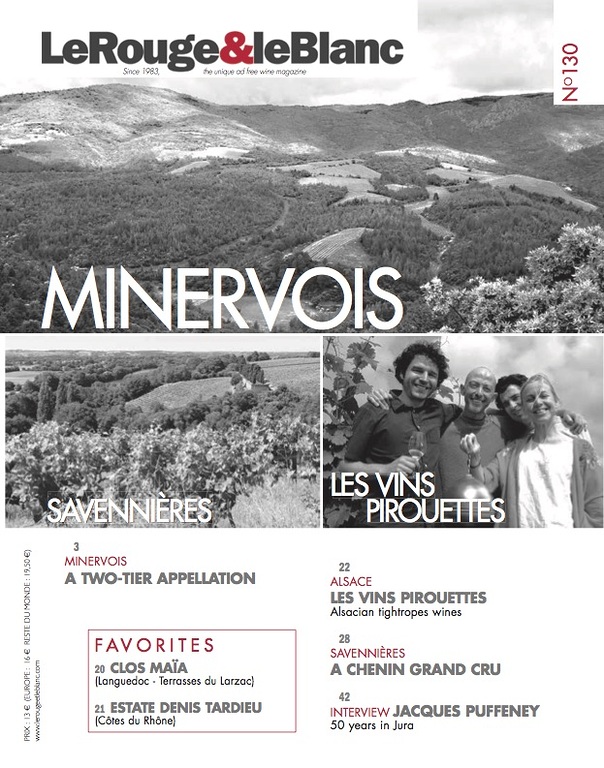You said "small appellations" ?
Pleasing all readers? An impossible task. All writers of books
or magazines know this. The publications and stories of Le
Rouge& le Blanc are like any other.
We have recently received a letter from a subscriber reproaching
us for taking too much interest in what he called «the
small French appellations» and not devoting enough pages
to the «big» AOC’s. (registered designation of origin, the
French protecting label system) At the time, this isolated
opinion did not especially make us react, and then, on reflection,
we had to recognize that it was justified ... and we take
it as a compliment. For three reasons.
The first is that it seems to us as useful, even necessary, that
some appellations are not forgotten, for lack of having been
entitled to a high media coverage. We are proud to have
devoted many pages to Marcillac, Madiran, Aligotés de
Bourgogne, Coteaux-Champenois, Anjou-Coteaux-de-la-
Loire, the young people of Savoie, Fronton and Cerdon, to
name only the numbers of the most recent years. We are the
only ones to do it on this scale, thus allowing our readers to
go off the beaten track and discover grape varieties, terroirs
and winemakers often different from those mentioned in
the publications or the more «classic» guides.
The second explanation is the very notion of «small» appellation.
What could be the causes that would relegate an
A.O.C to a second division? An uninteresting terroir? A
grape known for its modesty? Why not. But it is to be feared
that, in reality, the criterion of the selling price of bottles,
for the most part, determines in the eyes of amateurs the
qualitative hierarchy of appellations. And then we enter
another debate ... The tasters of our editorial board have, like
many others, a solid experience of tasting. Now, if we classify
our sessions according to the pleasure of tasting dozens of
bottles, we find that the theoretical (and therefore essentially
economic) hierarchy does not often intersect our feelings
of pleasure. We have suffered a lot more by tasting a series
of Médoc wines than by tasting seventy samples of Bandol
reds. This will probably not be a revelation for you, but our
experiences make us say with certainty that the real quality
of some winemakers is ultimately more important than the
supposed quality of a name. Once again, the guarantees
that an A.O.C should provide are not sufficient. And what
passionate amateur never had fun comparing blindly with
his friends a prestigious bottle and a much smaller wine to
finally find that the ‘smaller’ won the majority of votes?
Finally, the third reason to focus on «small» names is simply
that before becoming «big» most of the A.O.C. were
«small». Which amateurs were seriously interested in the
wines of Languedoc or Roussillon, thirty years ago. Or
the wines of Jura? Who would have thought in 1980 that
the wines of some winemakers in these regions would sell
between 50 and 100 euros (and sometimes much more on
the black market) in 2018? Of course, all low-profile names
will not be as successful. But mistrust all the same. Faced
with soaring prices for the most famous bottles, especially
in Bordeaux or Burgundy, fans are led to turn to regions
and appellations less «prestigious» today. Some of which
may become the sure values of tomorrow ... And these
fans are happy that some clear the path for them. This has
never prevented us from looking regularly also on renowned
A.O.C.’s. We are therefore sorry to disappoint our reader,
but, as you can see, LeRouge&leBlanc has not finished
devoting many pages to «small» appellations! And even from
this issue: neither Savennières nor the Minervois are probably
among the best known names in France. And yet …
Philippe Barret

